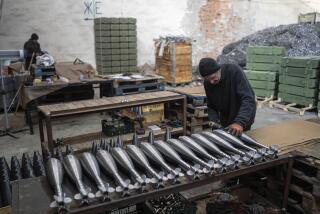NEWS ANALYSIS : Yugoslavia Arms Embargo Unlikely to Cut Fighting
- Share via
UNITED NATIONS — The U.N. Security Council’s attempt to quell ethnic violence in Yugoslavia with an arms embargo is expected to have little immediate impact on the fighting in the Balkan nation because both sides already have ample supplies of weapons, analysts say.
Neither side is supplied primarily with weapons that are imported legally--the only type of shipments that would be affected by the action taken by the Security Council earlier this week.
The Yugoslav national army, and the Serbian guerrillas that look to it for support, are amply supplied with domestically produced arms. And the forces of the breakaway republic of Croatia are armed primarily with weapons that were either seized from army stocks or were imported clandestinely.
Yugoslavia produces about 85% of the military equipment used by the army. Military analysts say federal troops can keep fighting for months without buying more weapons from abroad.
The Croatian National Guard, which was not well equipped when the republic declared its independence in June, has added to its stocks by laying siege to several army barracks in Croatia, eventually starving the federal troops into surrendering their weapons.
Nevertheless, analysts say, the Serbian side is far better equipped.
“Croatia is at a disadvantage in this war for territory,” said Stjepan Mestrovic, a sociology professor at Texas A & M University. “The U.N. action simply will maintain the status quo and allow Serbia to obliterate Croatia.
“It is a terribly unequal situation,” added Mestrovic, who was born in Croatia.
But U.N. officials expressed doubt that the embargo would have much impact on either side. For instance, Austrian Foreign Minister Alois Mock, whose nation is represented on the Security Council, said the embargo will not affect Croatian forces much because they are equipped primarily with weapons that are obtained illegally. The United States and most European countries had already imposed arms embargoes on both sides of the Yugoslavia conflict.
Earlier this month, for instance, a shipment of 19 tons of arms from South Africa was intercepted on its way to Croatia.
Yugoslavia’s large domestic military industry produces mainly the sort of assault rifles and other light weapons that are most useful in a guerrilla war. The army has imported some sophisticated electronic gear for domestically produced warplanes. And it imports some spare parts for older-generation Soviet weaponry. Most of those supplies have already been cut off, and, presumably, the arms embargo will stop the rest.
The Soviet Union, once Yugoslavia’s major source for imported arms, said last week that it had “practically” stopped all arms supplies to the Balkan country. The Soviet Foreign Ministry said in a statement: “It is known that a series of countries have imposed an embargo on the supply of weapons and military equipment to Yugoslavia. The Soviet Union, though not formally joining (the embargo) has stopped all special supplies to that country.”
More to Read
Sign up for Essential California
The most important California stories and recommendations in your inbox every morning.
You may occasionally receive promotional content from the Los Angeles Times.













